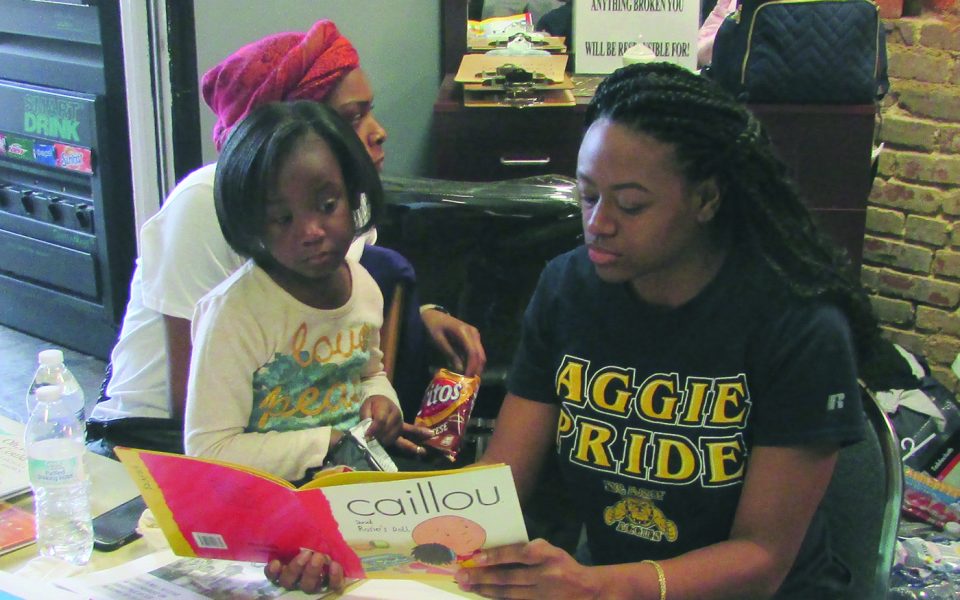Practically swallowed up in the big barber chair at Style Creators, 5-year-old Kaili Miles took a quick draw from her CapriSun juice pouch and made a valiant effort to hold back her tears as stylist Tammy Rankin applied a hissing flat-iron to her chin-length bob.
Then, liberated from the barber chair, Kaili acceded to volunteer Kamry Stanford’s invitation to sit on her lap. Dalya Scott, another volunteer member of the Henry E. Frye Free Law Society at NC A&T University, flipped the pages of Caillou & Rosie’s Doll — a book by Francine Allen that follows the exploits of a toddler who gets into his mother’s makeup and applies it to his sister’s doll — holding the volume up so Kaili could see.
Before long, Kaili’s mother came to collect her, and the two volunteers said goodbye.
“You’ve got to bring your other friends with you next time,” Stanford said. “Bring your whole class.”
The barbershop and hair salon in downtown Greensboro pulsed with black children, black moms, black dads, black grandmas and other black adults who love black children on a recent Saturday. The front section facing towards the shop’s display window, normally a repository for a decommissioned vending machine and bicycle, was reactivated into a reading room with a handful of children engrossed in books. Stanford led a train of children into a room at the rear of the shop, where owner Marcques “BarberQ” Tatum and two other barbers worked the chairs. Stanford showed a bookshelf stocked with dozens of titles and let them pick out a couple.
One of the girls thumbed through a photography book depicting infants of different skin colors.
“Ewwww,” the girl said.
“Those babies are beautiful,” Stanford remonstrated.
Kiera Hereford and Irving Allen, the parents of a 13-week girl, helped found Books And Black Youth in early July with a core group that includes four others. Their matching shirts riffed on the organization’s acronym: “It’s literature, BABY!” Hereford and Allen have been familiar faces at Greensboro protests against police brutality over the past couple years, and promoting literacy is part and parcel of their commitment to dismantle oppressive systems that result in disproportionate police contact and mass incarceration experienced by black people.
“We noticed systemically that reading and writing scores are looked at to determine how many prison beds are built,” Hereford said. “To dismantle the school-to-prison pipeline we decided to incentivize reading by offering free haircuts.”
Most barbershops, particularly on Saturdays, have wait times that the organizers thought would provide a natural opportunity for working in reading time. Along with promoting literacy, the program also aims to promote black businesses, and Books And Black Youth continuously raises funds to pay barbers, albeit at a discounted rate, rather than ask them to donate their services for free.
To be more inclusive, Hereford said that during the last couple events Books And Black Youth has expanded to included styling. The organizers are conscientious about trying to avoid getting in the way of the barbers and stylists or delaying their business. Allen said that so far everyone seems to be happy, although at one point Tammy Rankin had to ask a volunteer to vacate one of the barber chairs for a customer.
Antwan Timmons brought his 4-year-old son, Kalil Williams, into the barbershop so they could both get a trim. Kalil said he read “a whole lot” of books before his turn in the barber chair came, and that he liked “the chicken book” the best. After BarberQ straightened the hairline around Kalil’s ears and pulled off the gown, the child startled at the sound of the barber’s blower. Then, when his father sat down in the chair, Kalil picked up the blower and blasted his dad in the face.
The children are welcome to take books home with them, and the collection stays at the barbershop between events. Titles like JoJo’s Flying Sidekick by Brian Pinkney and Ndito Runs by Laurie Halse Anderson and Anita Van Der Merwe provide positive portrayals of black children as protagonists overcoming challenges.
“Systematically, our kids are targeted differently,” Hereford said, “and we want to be intentional with the books we pick out. We’re aiming for them to be by people of color or about people of color.
“We want to create a safe space for kids to be welcome and see themselves in literature,” she added.
Join the First Amendment Society, a membership that goes directly to funding TCB‘s newsroom.
We believe that reporting can save the world.
The TCB First Amendment Society recognizes the vital role of a free, unfettered press with a bundling of local experiences designed to build community, and unique engagements with our newsroom that will help you understand, and shape, local journalism’s critical role in uplifting the people in our cities.
All revenue goes directly into the newsroom as reporters’ salaries and freelance commissions.


Leave a Reply